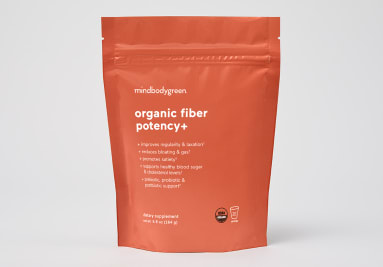
Image by Jimena Roquero / Stocksy
April 8, 2023
Inflammatory bowel disease (IBD) is a chronic inflammatory GI condition that includes Crohn’s disease and ulcerative colitis. Though much is still unknown about this curious chronic illness, cases of IBD are rapidly increasing in the U.S.
According to a 2020 observational study published in the journal Inflammatory Bowel Diseases, adult prevalence of IBD increased 123% from 2007 to 2016; pediatric prevalence increased 133%. So, what the heck is going on with gut health in this country?
Advertisement
This ad is displayed using third party content and we do not control its accessibility features.
Why are IBD cases on the rise?
Per a 2015 review published in the International Journal of Clinical and Experimental Medicine, IBD pathology is influenced by both genetic and environmental risk factors1. These include the western diet, stress, lack of exposure to germs as a child, appendectomy, smoking, microorganisms, and even certain medications (e.g., NSAIDs, antibiotics, and oral contraceptives).
How to reduce your IBD risk
This laundry list of risk factors may seem daunting, but there’s one simple and effective thing you can do to reduce the likelihood of developing IBD: Eat more fiber.
Yup, increasing your daily intake of this gut-healthy carb can help protect against GI issues—including inflammatory bowel disease. In fact, in a prospective study published by Gastroenterology, participants with the highest intake of dietary fiber had a 40% reduced risk2 of Crohn’s disease compared to participants with the lowest intake.
According to a 2022 Nutrients review, increasing daily fiber intake3 is a viable strategy for preventing IBD thanks to dietary fiber’s ability to:
- Reduce pro-inflammatory cytokines
- Modulate intestinal microbiota
- Reduce GI side effects
Advertisement
This ad is displayed using third party content and we do not control its accessibility features.
The takeaway
IBD cases in the United States are on the rise for adults and children alike. Luckily, you can reduce your risk of developing IBD and other gut health problems with small changes to your nutrition and lifestyle habits—like adding more dietary fiber to your diet.


